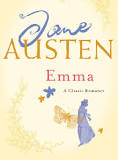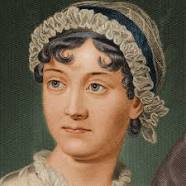Emma Page #24
Emma, by Jane Austen, is a novel about youthful hubris and the perils of misconstrued romance. The story takes place in the fictional village of Highbury and the surrounding estates of Hartfield, Randalls, and Donwell Abbey and involves the relationships among individuals in those locations consisting of "3 or 4 families in a country village". The novel was first published in December 1815 while the author was alive, with its title page listing a publication date of 1816. As in her other novels, Austen explores the concerns and difficulties of genteel women living in Georgian–Regency England; she also creates a lively comedy of manners among her characters and depicts issues of marriage, gender, age, and social status.
He thought much of the evils of the journey for her, and not a little of the fatigues of his own horses and coachman who were to bring some of the party the last half of the way; but his alarms were needless; the sixteen miles being happily accomplished, and Mr. and Mrs. John Knightley, their five children, and a competent number of nursery-maids, all reaching Hartfield in safety. The bustle and joy of such an arrival, the many to be talked to, welcomed, encouraged, and variously dispersed and disposed of, produced a noise and confusion which his nerves could not have borne under any other cause, nor have endured much longer even for this; but the ways of Hartfield and the feelings of her father were so respected by Mrs. John Knightley, that in spite of maternal solicitude for the immediate enjoyment of her little ones, and for their having instantly all the liberty and attendance, all the eating and drinking, and sleeping and playing, which they could possibly wish for, without the smallest delay, the children were never allowed to be long a disturbance to him, either in themselves or in any restless attendance on them. Mrs. John Knightley was a pretty, elegant little woman, of gentle, quiet manners, and a disposition remarkably amiable and affectionate; wrapt up in her family; a devoted wife, a doating mother, and so tenderly attached to her father and sister that, but for these higher ties, a warmer love might have seemed impossible. She could never see a fault in any of them. She was not a woman of strong understanding or any quickness; and with this resemblance of her father, she inherited also much of his constitution; was delicate in her own health, over-careful of that of her children, had many fears and many nerves, and was as fond of her own Mr. Wingfield in town as her father could be of Mr. Perry. They were alike too, in a general benevolence of temper, and a strong habit of regard for every old acquaintance. Mr. John Knightley was a tall, gentleman-like, and very clever man; rising in his profession, domestic, and respectable in his private character; but with reserved manners which prevented his being generally pleasing; and capable of being sometimes out of humour. He was not an ill-tempered man, not so often unreasonably cross as to deserve such a reproach; but his temper was not his great perfection; and, indeed, with such a worshipping wife, it was hardly possible that any natural defects in it should not be increased. The extreme sweetness of her temper must hurt his. He had all the clearness and quickness of mind which she wanted, and he could sometimes act an ungracious, or say a severe thing. He was not a great favourite with his fair sister-in-law. Nothing wrong in him escaped her. She was quick in feeling the little injuries to Isabella, which Isabella never felt herself. Perhaps she might have passed over more had his manners been flattering to Isabella's sister, but they were only those of a calmly kind brother and friend, without praise and without blindness; but hardly any degree of personal compliment could have made her regardless of that greatest fault of all in her eyes which he sometimes fell into, the want of respectful forbearance towards her father. There he had not always the patience that could have been wished. Mr. Woodhouse's peculiarities and fidgetiness were sometimes provoking him to a rational remonstrance or sharp retort equally ill-bestowed. It did not often happen; for Mr. John Knightley had really a great regard for his father-in-law, and generally a strong sense of what was due to him; but it was too often for Emma's charity, especially as there was all the pain of apprehension frequently to be endured, though the offence came not. The beginning, however, of every visit displayed none but the properest feelings, and this being of necessity so short might be hoped to pass away in unsullied cordiality. They had not been long seated and composed when Mr. Woodhouse, with a melancholy shake of the head and a sigh, called his daughter's attention to the sad change at Hartfield since she had been there last. “Ah, my dear,” said he, “poor Miss Taylor--It is a grievous business.” “Oh yes, sir,” cried she with ready sympathy, “how you must miss her! And dear Emma, too!--What a dreadful loss to you both!--I have been so grieved for you.--I could not imagine how you could possibly do without her.--It is a sad change indeed.--But I hope she is pretty well, sir.” “Pretty well, my dear--I hope--pretty well.--I do not know but that the place agrees with her tolerably.” Mr. John Knightley here asked Emma quietly whether there were any doubts of the air of Randalls. “Oh! no--none in the least. I never saw Mrs. Weston better in my life--never looking so well. Papa is only speaking his own regret.” “Very much to the honour of both,” was the handsome reply. “And do you see her, sir, tolerably often?” asked Isabella in the plaintive tone which just suited her father. Mr. Woodhouse hesitated.--“Not near so often, my dear, as I could wish.” “Oh! papa, we have missed seeing them but one entire day since they married. Either in the morning or evening of every day, excepting one, have we seen either Mr. Weston or Mrs. Weston, and generally both, either at Randalls or here--and as you may suppose, Isabella, most frequently here. They are very, very kind in their visits. Mr. Weston is really as kind as herself. Papa, if you speak in that melancholy way, you will be giving Isabella a false idea of us all. Every body must be aware that Miss Taylor must be missed, but every body ought also to be assured that Mr. and Mrs. Weston do really prevent our missing her by any means to the extent we ourselves anticipated--which is the exact truth.” “Just as it should be,” said Mr. John Knightley, “and just as I hoped it was from your letters. Her wish of shewing you attention could not be doubted, and his being a disengaged and social man makes it all easy. I have been always telling you, my love, that I had no idea of the change being so very material to Hartfield as you apprehended; and now you have Emma's account, I hope you will be satisfied.” “Why, to be sure,” said Mr. Woodhouse--“yes, certainly--I cannot deny that Mrs. Weston, poor Mrs. Weston, does come and see us pretty often--but then--she is always obliged to go away again.” “It would be very hard upon Mr. Weston if she did not, papa.--You quite forget poor Mr. Weston.”
Translation
Translate and read this book in other languages:
Select another language:
- - Select -
- 简体中文 (Chinese - Simplified)
- 繁體中文 (Chinese - Traditional)
- Español (Spanish)
- Esperanto (Esperanto)
- 日本語 (Japanese)
- Português (Portuguese)
- Deutsch (German)
- العربية (Arabic)
- Français (French)
- Русский (Russian)
- ಕನ್ನಡ (Kannada)
- 한국어 (Korean)
- עברית (Hebrew)
- Gaeilge (Irish)
- Українська (Ukrainian)
- اردو (Urdu)
- Magyar (Hungarian)
- मानक हिन्दी (Hindi)
- Indonesia (Indonesian)
- Italiano (Italian)
- தமிழ் (Tamil)
- Türkçe (Turkish)
- తెలుగు (Telugu)
- ภาษาไทย (Thai)
- Tiếng Việt (Vietnamese)
- Čeština (Czech)
- Polski (Polish)
- Bahasa Indonesia (Indonesian)
- Românește (Romanian)
- Nederlands (Dutch)
- Ελληνικά (Greek)
- Latinum (Latin)
- Svenska (Swedish)
- Dansk (Danish)
- Suomi (Finnish)
- فارسی (Persian)
- ייִדיש (Yiddish)
- հայերեն (Armenian)
- Norsk (Norwegian)
- English (English)
Citation
Use the citation below to add this book to your bibliography:
Style:MLAChicagoAPA
"Emma Books." Literature.com. STANDS4 LLC, 2025. Web. 6 Jan. 2025. <https://www.literature.com/book/emma_29>.




Discuss this Emma book with the community:
Report Comment
We're doing our best to make sure our content is useful, accurate and safe.
If by any chance you spot an inappropriate comment while navigating through our website please use this form to let us know, and we'll take care of it shortly.
Attachment
You need to be logged in to favorite.
Log In